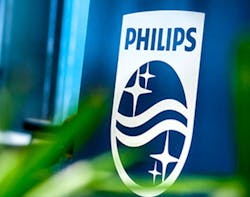Dutch electronics giant Philips on Jan. 30 posted soaring profits of 1.87 billion euros (US$2.3 billion) in 2017, as it increasingly focuses its business on health technology.
Net profits were up 25%, while sales rose by two percent to almost 18 billion euros, as health-conscious consumers snapped up everything from electric toothbrushes to kitchen appliances.
"2017 was a good year, as we continued the transformation of Philips into a focused leader in health technology and delivered on our improvement targets for the year," chief executive Frans van Houten said.
Philips is best known for the manufacture of lightbulbs, electrical appliances and television sets.
But it has pulled out of these activities in face of fierce competition from Asia to focus on health technology, such as computer tomography and molecular imaging, as well as household appliances.
The group, which sold its first lightbulb a few years after it was founded in 1891, listed its Philips Lighting division in mid-2016 and has now reduced its stake in the arm to just 29%.
"As a result, Philips no longer has control over Philips Lighting," the Amsterdam-based group said.
The decision seemingly paid off, with Philips saying it was particularly pleased with last year's fourth-quarter results.
Philips inked a number of deals in the last three months of 2017 to supply medical and healthcare equipment ranging from integrated systems to treat respiratory diseases in China to app-based ultrasound solutions as standard equipment in the German armed forces.
"Philips' performance in the fourth quarter demonstrates that we are gaining momentum," Van Houten said.
Full-year results were driven double-digit growth in the Middle East and Turkey and high single-digit growth in China, Latin America and Central and Eastern Europe.
"Mature geographies posted low single-digit growth" reflecting the trend in Western Europe and North America, Philips said.
The group proposed a dividend of 0.80 euros per ordinary share.
Philips took a hit in October when it temporarily suspended production of defibrillators for the U.S. market to allow closer inspections in a deal reached with the American government.
Last month, Philips "had a constructive meeting with the FDA... and will provide monthly status reports to the FDA highlighting the progress in addressing the observations," it said.
The company, which insisted that the decision was not related to any question about the quality of the machines or that they posed a health risk to patients, said it has partially resumed the shipment of certain models of defibrillators.
Copyright Agence France-Presse, 2018
About the Author
Agence France-Presse
Copyright Agence France-Presse, 2002-2025. AFP text, photos, graphics and logos shall not be reproduced, published, broadcast, rewritten for broadcast or publication or redistributed directly or indirectly in any medium. AFP shall not be held liable for any delays, inaccuracies, errors or omissions in any AFP content, or for any actions taken in consequence.
